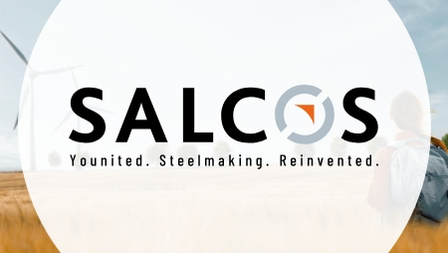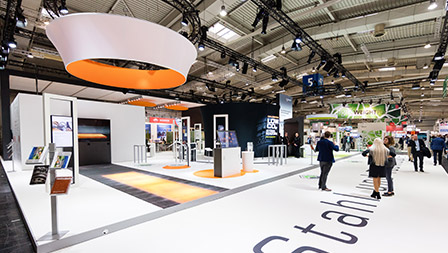A visit to Germanwatch
25.04.2023 | Salzgitter AG
As far as the aims and objectives are concerned, Christoph Bals, Managing Director of the environment and development organization Germanwatch, and Gunnar Groebler, CEO of Salzgitter AG, are largely in agreement. But what about the way to achieve them? An excerpt from a discussion that took place in Bonn in January 2023 on the role of the German primary materials industry, political framework conditions, supply chains and green lead markets.
The role of the German primary materials industry and common goals
Christoph Bals: We are still the country with the largest primary materials industry in Europe. It has contributed significantly to our prosperity, although we must not forget its partly fatal history under National Socialism. Today we have to demonstrate that Germany can transform this industry. This is a central aspect for the future of our model of prosperity. At the same time, it is an important signal, especially for emerging nations, which have far more dynamic markets in this area, that the necessary transformation can also succeed in these sectors.
Gunnar Groebler: So you see the primary materials industry as having a future in Germany?
CB: At least important parts. A transformed primary materials industry, together with a broad supply chain, also serves to build up resilience in facing geopolitical challenges. Some areas, ammonia production, for example, will probably no longer make sense in view of high gas prices and the foreseeable prices for hydrogen. In some industries, there are energy-intensive intermediate products that could be more meaningfully produced in countries with more solar and wind energy. Their transport by ship would be easier than transporting hydrogen.
GG: Are you following what we're doing?
CB: Of course we are, after all Salzgitter AG is one of the five largest European steel groups. Following your announcement at Hannover Messe in 2018 that you are pursuing innovative paths in C02 reduction you have become even more exciting for us. Such action is exactly what we wanted. We are dialoging with companies from various industries on transformation issues, also so as to examine what kind of framework will be necessary. In this context, we are speaking with representatives from the political arena. We want an economy in Europe that does not undermine human rights or livelihoods around the world. Your goal of establishing a circular economy and neutralizing greenhouse gases is at least tending in that direction.
GG: The time is ripe to take bigger steps now. We see this willingness with our employees and also in the co-determination area. In the last five to seven years, attitudes toward transformation have changed in society, politics, and also in business. I am happy and grateful that we have the technical concept, which has put us in a position to be the pacemaker – and subsequently the role model of the transformation. We need to rethink industry.
»We have a lot of interest in showing which parts of the industry are serious about transformation.«
Christoph Bals, Managing Director Germanwatch
The duty of care in the supply chain and the impact on the issue of human rights
GG: We are looking very closely at where our input comes from and where our products are going to. Our influence is quite strong in Europe, but we are rather small in the global context. This gives us relatively modest leverage over our upstream suppliers, some of whom are significantly larger than we are.
CB: We believe that such laws as we have in Germany and are currently being negotiated at the European level will strengthen Europe’s market power and help to increase pressure in the world for the respect of human rights and for climate policy.
GG: Yes, but we need to find a systematic approach that does not become a bureaucratic treadmill. The energy spent on the effort to implement the Supply Chain Act would be better invested in work on the ground. Moreover, we should at least be careful about imposing our canon of values on other countries and cultures, and should instead take the sovereignty of individual states into account. When others are talking about Europe, we also insist on our set of values.
CB: Human rights have been ratified by almost all states, although there is some room for interpretation. But in the case of child labor, for example, or concerning the basic standards for dealing with employees, globally accepted law must be enforced. We cannot let authoritarian states get away with that.
GG: I'm with you on that one. But I don't think you can simply hand over all the responsibility to industry and obligate companies to ensure compliance even in individual locations, for example. We are not in a position to do that.
CB: Yes and no. The treatment of the people you hire or the harm you inflict by dumping waste or toxins in rivers – that is the responsibility of companies in their own supply chain. Of course, companies should not be in the business of proselytizing an authoritarian government. Human rights address national states first and foremost.
The demand for renewable energies
CB: We are a founding member of the Renewables Grid Initiative, an alliance of civil society organizations and grid operators. The alliance is concerned with the question as to what kind of power grid we need to guarantee 100% electricity from renewables. The good news is that theoretically up to 95% is already possible today. In any case, the plans are there already. In the area covered by the eastern German transmission system operator 50Hertz Transmission, we are already at 80%. Fluctuations due to lack of wind or sun can be managed.
GG: Not on the grid side, but what about generation?
CB: Even the three to four weeks of dark periods per year could be absorbed by storage, demand-oriented solutions, and grid expansion, for example. On the Atlantic or North Sea coast winds are almost always blowing and this fits in very well, it is just a matter of transporting energy. In addition, more and more companies are optimizing their demand management. They are beginning, at least partially, to act as traders. Repairs are postponed to months with dark periods and production may even be curtailed for a short time. They resell their electricity from the long-term contracts. With regard to what still needs to be made up for, gas is the solution at the moment, followed by hydrogen later.
GG: If we continue to decarbonize, we will still need significantly more renewable electricity than what we are generating today. This will only work if we add more renewable energy capacities. The prerequisite for this is that we drive technological developments forward, and, in addition to existing offshore wind technology, also bring floating offshore wind to industrial maturity. This opens up potential for us in the Mediterranean and in the Atlantic, where only floating technology will work given the depths involved.
Specifically, I mean the financing of offshore wind farms, but above all the approval procedures. We can't wait ten years for a permit and another seven years for electricity to be delivered for the first time.
Common transformation goals
CB: I am counting on cooperation between heavy industry and environmental associations. I have often seen that more can be achieved with unusual alliances between business and environmental associations, perhaps together with trade unions, than by way of confrontation. Such alliances could significantly accelerate the expansion of renewable energies. We should reward first movers who take early risks. And at the same time make it clear that those who follow late can count on less and less support.
GG: I agree with you there. It will also be a joint task to involve the population, because that is where the delay usually arises. People agree that renewable energies must be expanded, but no one wants to have the wind turbines nearby. This is where we need concerted action.
CB: As part of the Renewable Grid Initiative, we are supporting some major grid construction projects in Germany. With regard to acceptance problems, my people meet with citizen groups to work together to determine what are the real problems and what are the pseudo-problems. We also take this approach to the nature conservation concerns that grid expansion entails. In some cases, new concepts can even improve biodiversity. To this end, we are engaged in an intensive, sometimes initially controversial dialog with many environmental associations.
»We can't wait ten years for an offshore wind farm and another seven years for it to deliver electricity for the first time.«
Gunnar Groebler, Chief Executive Officer of Salzgitter AG
The wish for a differentiated view
CB: The climate issue is of existential concern to the younger generation in particular. We have already passed some of the tipping points of the climate system, as is evident in the West Antarctic and Greenland, for example. We can still curb the rise in temperature, but the fact that sea levels are rising by a number of meters can no longer be stopped, only slowed down. I therefore understand the protests of many young people. However, I would like to see them applying the same energy with which they last rebelled in Lützerath, for example, to accelerate future-oriented solutions. If we can get this kind of dynamics to drive the steps to the future forward that will replace the old structures, we can generate a lot of positive momentum.
GG: It would be great if we could also reach a point where industry is not seen as a monolith, and people acknowledge that we have set out on our own path. I have to live with the fact that, from the critics' point of view, this is not fast or radical enough. However, I have to follow technical and economic laws that cannot be shifted indefinitely. I can't build a direct reduction plant in less than three years. It just doesn't work technically. Better information and support would help to invalidate such blanket condemnations. We need more understanding of very practical legalities. It won't help if we shut down steel mills in Germany and import the steel – which would probably involve a higher CO2 footprint.
CB: We have a great interest in showing which parts of the industry are serious about transformation. Conversely, the attempts of a number of players to engage in greenwashing have hurt us so far. That is why we welcome the new reporting requirements. At last, there are some test criteria in place now.
GG: We have joined the Science Based Targets initiative, which also controls and monitors the measures according to scientific criteria. The EU taxonomy, on the other hand, is a bureaucratic monster.
CB: I see this differently. When reporting requirements are introduced, companies always have to get used to them first. Up until now, there were many different report formats. Taxonomy clears the jungle. It also helps SMEs, where many are struggling to come to grips with the issues for the first time, and creates a level of transparency that we didn't have before. Pioneers are becoming visible. The uniform standards are resulting in comparability for the first time.
GG: However, it does not reflect our current efforts. How much money we are putting into transformation, for example. In the current annual report, we can only report taxonomy-compliant sales in the single-digit percentage range. And that won't change until 2026, either.
CB: It is indeed a problem that the transformative part is still missing in taxonomy. I am a member of the Sustainable Finance Advisory Board and we are currently working on a proposal to change that.
Are green lead markets helping to safeguard the business model?
GG: Our customers are already buying CO2 reduced steel today. And we are already agreeing deliveries with them as from 2026, when we will have implemented stage 1 of our SALCOS® program. Do you believe, as we do, that it can make sense to create incentives or set quotas via politics in order to establish such green lead markets on the demand side as well and thereby additionally accelerate the transformation on a market economy level?
CB: I am definitely an advocate of green lead markets. This would mean defining exactly what is to be supported. What are ambitious and achievable, clearly defined milestones for the sectors on the road to green hydrogen, green power and ultimately green steel? At least at the European level, these certifications should be achieved in order to compensate for competitive disadvantages. Green lead markets oriented towards the 1.5°C limit could also be the focus of the global climate club that Olaf Scholz suggested. There is a need to define what the milestones are for the sectors on the path to achieving the Paris climate goal. In Germany, for example, public sector procurement could lead the way, creating demand and underlining credibility. Learning along the way and readjustment will be necessary. Greenwashing destroys trust in this.
GG: I would like to see a pragmatic approach. If we first work through what green hydrogen actually is, and then fall back on the EU definition, we won't have green hydrogen for a long time, at least not in the quantities we need. The same holds true for green steel. Basically, we have to serve two worlds: the political world, which is undergoing transformational qualification, and the customer world, which is exclusively about the ton of C02 per ton of product.
About Germanwatch
Germanwatch is an independent environmental, development and human rights organization committed to advancing future-viable, sustainable global development. Under the heading of sustainability, the organization examines and considers socially equitable, ecologically compatible and economically viable aspects and factors. Key topics include climate protection and climate adaptation, corporate responsibility, sustainable finance, as well as climate and human rights issues.
More than 100 full-time and voluntary staff members as well as interns and young people who complete a Voluntary Ecological Year or a Voluntary Social Year in political life at Germanwatch are active at the Bonn and Berlin locations. In addition, there is a growing network comprising volunteers, honorary staff and international organizations.

















